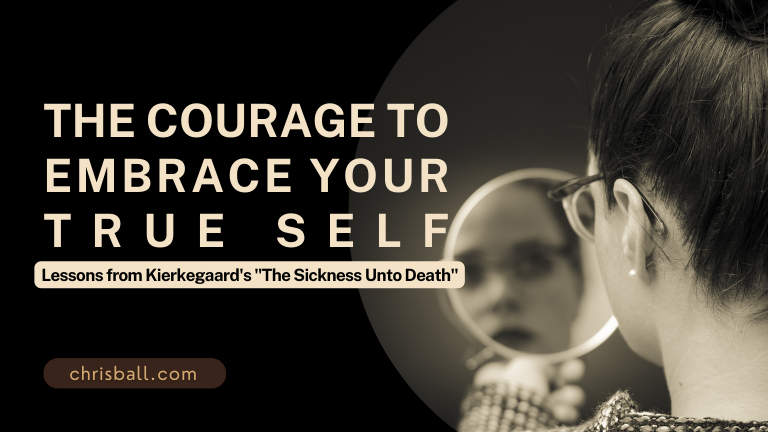In one of my earlier blog posts, I mentioned that I’ve been immersed in the thought-provoking world of Søren Kierkegaard’s “The Sickness Unto Death”. This book, though challenging in its language and thought, has been a wellspring of wisdom and insight for me over the past year. So much so, that I’ve embarked on an ambitious journey: re-translating this seminal work to make it more accessible to our 21st-century minds. The original Danish, and even its English translations, carry the weight of archaic language, making it a tough read. It’s a challenge I wrestled with, and now I’m committed to untangling it for myself and others.
A particularly striking aspect of Kierkegaard’s work deals with our perception of others’ lives. It’s easy to fall into the trap of believing that those around us, especially those who appear successful, are leading perfect lives, free from inner turmoil. But this couldn’t be further from the truth. Despair is often a silent battle, hidden behind a facade of success and achievement. Many who seem to glide effortlessly through life are actually struggling with profound inner conflicts.
The illusion of a seamless life is just that – an illusion. These individuals may not show any visible signs of struggle. They fit perfectly into societal moulds, achieving what is expected, all while exuding confidence and assurance. Yet, beneath this smooth exterior often lies a deep-seated despair, unseen and unacknowledged.
Most of us misunderstand despair. We equate a comfortable, trouble-free life with the absence of despair. But despair isn’t just about visible struggles or obvious hardships. It’s about what happens within the silent confines of our minds and hearts. The common advice of ‘you’ll regret speaking out ten times more than you’ll regret staying silent even once‘ touches on this idea. We’re often told that speaking up leads to complications and that silence is the safer option. However, the reality is that silence can be the most dangerous choice.
Silence leaves us alone with our thoughts and fears, without immediate repercussions or external judgment. It seems easier, but it’s in this ease that the real danger lies. True fear and regret aren’t always about the actions we take or the words we say. Rather, they’re about the internal battles we face – the fear of making a mistake, the dread of venturing into the unknown within ourselves, and the apprehension of revealing our true identities to the world.
This societal misunderstanding of risk and bravery is significant. We’re often told that to avoid risk is to avoid loss. But what if the greatest risk is not daring to discover who we truly are? By avoiding the journey of self-discovery and the embrace of our authentic selves, we risk losing the most precious thing of all – our identity.
Mistakes and missteps are not just inevitable; they’re essential. They are the signposts that guide us on the path to understanding ourselves. Without taking risks, without the courage to explore and accept our true selves, we remain lost, guided by external expectations instead of our inner compass.
As I continue to re-translate “The Sickness Unto Death,” I am constantly reminded of this profound truth. Kierkegaard’s exploration of despair is not just a philosophical musing; it’s a call to courage – the courage to face our inner selves, to acknowledge our fears and hopes, and to embrace the authentic identity that lies beneath the surface.
I’ll keep you updated on my journey with the translation. My hope is that, through this new lens, Kierkegaard’s wisdom will resonate with you, inspiring you to embark on your own journey of self-discovery and courage. Remember, the only true defeat in life is not failing or making mistakes, but failing to know and be yourself.
